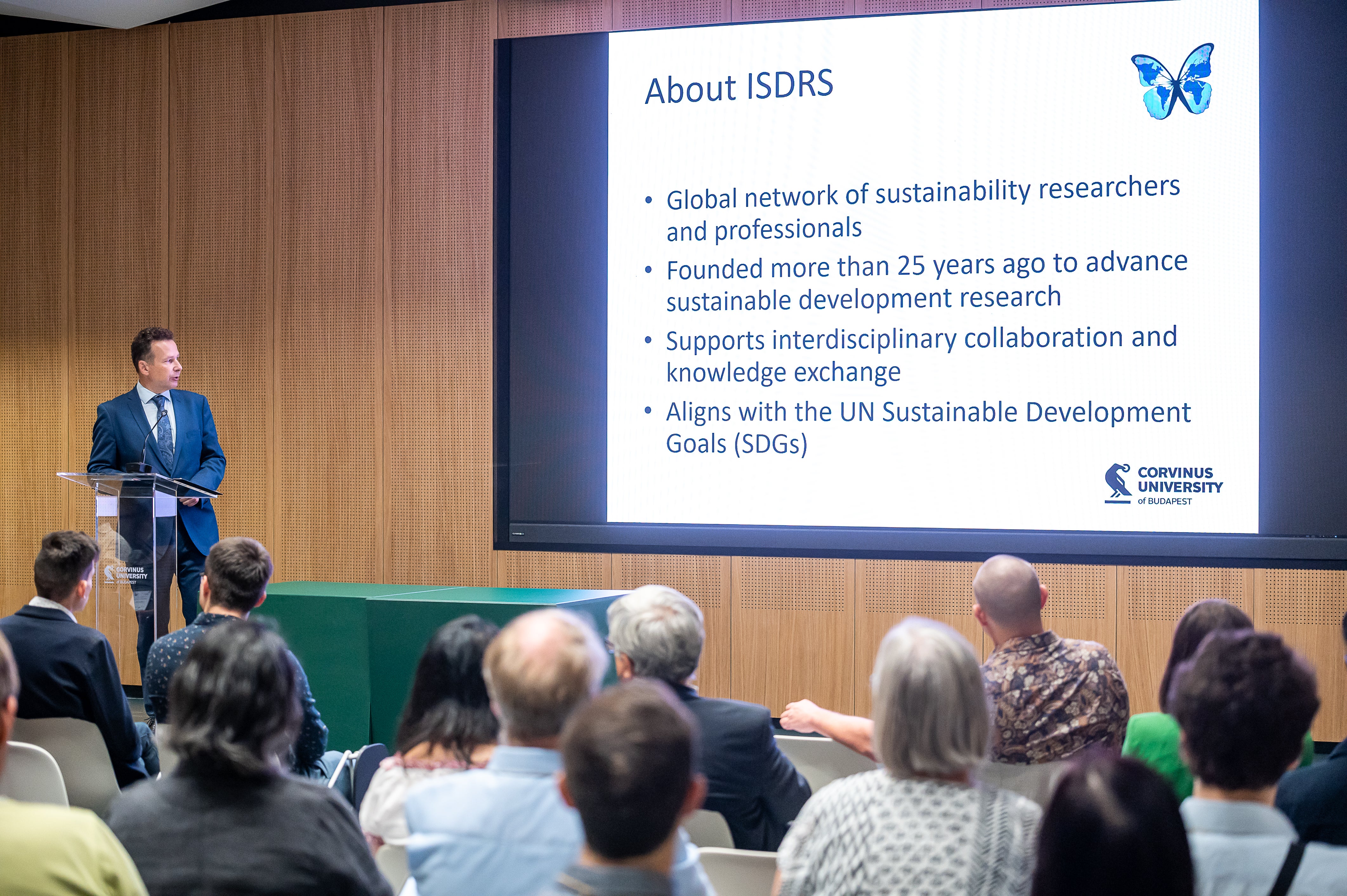Sustainability Now: Headwinds, Tailwinds and Seismic Shifts

In his welcome speech, conference host Dr Gyula Zilahy, Professor at Corvinus and President of ISDRS, highlighted that the concept of sustainable development has been guiding researchers for more than 30 years. He emphasised the need to reflect on what sustainability means today – what we have achieved, what has changed, and what new challenges we face. He also pointed out that this year’s conference places a special focus on the relationship between sustainability and artificial intelligence, and that a joint statement titled the “Budapest Declaration” will be released to highlight the importance of sustainability research (the Declaration will be published shortly).
Bruno van Pottelsberghe, Rector of Corvinus, briefly introduced the more than 100-year-old university to the participants and presented the key elements of the newly adopted institutional development plan, the Bridge Strategy, recently approved by the Senate. He underlined the strategic focus on internationalisation, along with two cross-cutting themes: sustainability and AI.
Nepali Landscapes and an Unexpected Petőfi Quote
Dinesh Bhuju, Executive Director of MICD, Mid-West University (Nepal) and President of the Resources Himalaya Foundation, reflected on the lessons and outcomes of the 30th ISDRS conference held last year in Kathmandu. He believes that research – particularly in the field of sustainable development – is the “beating heart” of ISDRS, while in Nepal, sustainability is deeply rooted in the culture and everyday lives of people who have lived in harmony with nature for generations. Thanks to the Society’s support, they have been able to launch important research projects, such as examining the effects of energy poverty on girls’ education in remote mountain areas.
At the end of his presentation, Bhuju unexpectedly quoted Hungarian poet Sándor Petőfi, from his poem To the National Assembly, reflecting on the difficulty of progress when we do not start from the true beginning: “Who would imagine a temple-builder, Who starts with the tower, not the foundation?”
For and Against
In his presentation titled “Sustainability Transition with Headwinds and Tailwinds”, Csaba Kőrösi, Director of Strategy at the Blue Planet Foundation and President of the 77th UN General Assembly, examined the barriers to – and the enablers of – sustainability efforts. Using vivid examples, he explained how even measuring progress towards the 17 Sustainable Development Goals (SDGs) is a challenge, due to the lack of a unified methodology. This, he argued, seriously undermines credibility, as conflicting data can cause confusion.
Among the key “headwinds” hampering the transition, he identified rising geopolitical rivalries, which often override collaboration – even when cooperation would be the logical path forward. He also discussed the disruptive impact of armed conflicts on sustainability agendas. While there were 29 armed conflicts globally in 2019, today there are 52, and global military spending is increasing faster than global GDP – meaning that attention and resources are being diverted away from sustainability efforts.
Kőrösi also pointed to problems with the national implementation of the SDGs. Reports are inconsistent, and national strategic plans often fail to meaningfully incorporate sustainable development goals. Funding for the transition is rarely integrated into national budgets and is often treated as a marginal “extra”, which is not enough to bring about real change.
On the more optimistic side, or the “tailwinds”, he noted that the growing frequency of extreme weather events is prompting societies to take climate change more seriously. He also highlighted the potential of technological advances, such as artificial intelligence, quantum computing, and fusion energy. Encouragingly, investment in renewable energy nearly doubled last year compared to fossil fuels.
Seismic Shifts
Dr Barbara Wassen, Ambassador-at-Large for Climate Affairs and Climate Diplomacy at the Hungarian Ministry of Energy, presented seven major, or “seismic”, changes that are already shaping our present and will define the future. Her talk covered the shifting geopolitical landscape, the energy transition, energy security risks, the geopolitics of energy, electrification, and the increasing pressure to enhance competitiveness.
She also stressed the importance of adaptability. Recalling conversations with business leaders, she noted that the aftermath of COVID, the energy crisis, war, and the rise of AI have all demanded new kinds of leadership.
In closing, Dr Wassen shared seven positive takeaways, including the fact that the Paris Agreement is working and delivering results. She reiterated the ongoing importance of global cooperation and reducing carbon emissions.
Wicked Problems and University-Level Sustainability
Professor Emeritus Sándor Kerekes from Corvinus shared a personal reflection on how difficult it is to navigate between various theories and identify the right course of action. In today’s complex and uncertain world, even with the help of AI, it is impossible to eliminate every risk. He argued that we must experiment, learn from our mistakes, and evolve through a continuous, cyclical process – a necessity when facing the kind of unstructured, “wicked” problems that characterise our times.
In the final talk of the session, Katalin Ásványi, Dean for Sustainability at Corvinus, outlined the university’s approach to sustainability. She explained that the institution’s efforts rest on four pillars: education, research, social impact, and sustainable operations.
In addition to receiving international recognition for its sustainability education, Corvinus encourages both researchers and students to conduct research in this field. The university also takes part in international projects and works closely with its local community, corporate partners, alumni, and current students on a range of sustainability initiatives. From small-scale efforts like community planting and composting to the construction of the new Gellért Campus – now one of Hungary’s most sustainable educational buildings – Corvinus is striving to make sustainability a core part of its operation.